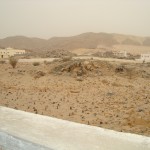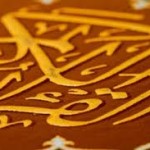Impurity and Wudhu
Shortened Question:
Is my ablution and salah valid in the given cases?
Question:
Salaam,
I have piles (anal fistuli) due to which I am unable to properly clean my rear. Though I try my level best however the extra skin as a result of the fistuli makes it impossible for the finger to properly clean. I am able to clean it 70% of it and the remaining anal area is inaccessible. Now my question is,
- There are times that I observe stool (excreta) marks on my underwear. After passing gas, usually that area is wet with some stool coming out on which I don’t have any control on. Is my ablution valid in such a state? Which means, with an underwear on which there are stool marks and the rear area which was wet and later dried due to passing of the gas, can I proceed to perform salah in office without new ablution and cleaning? Or would it need complete change of underwear and thorough cleaning again with a fresh ablution? I have been able to perform salah in office with one ablution a day and closely monitoring that I don’t break the wudhu. With this new condition, every hour or so I am passing on gas with marks in my underwear and the area being wet.
- Recently I was performing salah where I did not pass on gas, however I could feel that I was about to which I held back to complete the salah. However, when I coughed it put a lot of pressure in the anal area and I could feel few (2) small gas bubbles burst in the anal area. Though I intentionally did not pass on gas however with the piles condition now, chances are that there was some gas which was stuck and contracted in the anal muscles when coughed and came out. Did this invalidate my wudhu & salah?
Answer:
In the Name of Allah, the Most Gracious, the Most Merciful.
As-salāmu ‘alaykum wa-rahmatullāhi wa-barakātuh.
- If you see any impurity on your undergarment, the wudhū will be invalidated. You cannot perform salāh with the previous wudhū. You should wash your private parts and undergarment or even change it and make fresh wudhū before performing salāh[1].
In order to avoid having to always clean or change your underwear, you may place a tissue in the undergarment to absorb any emission.
- If you are certain that you passed gas, then your wudhū and salāh have been invalidated[2]. If you were not certain, then your wudhū will be regarded as intact and your salāh will be valid[3].
And Allah Ta’āla Knows Best
Hanif Yusuf Patel
Student Darul Iftaa
UK
Checked and Approved by,
Mufti Ebrahim Desai.
Karachi]
References
[1] [Imdād al-Fatāwa, 1: 66, Maktabah Dar al-Ulūm Karachi; Imdād al-Ahkām, 1: 348, Maktabah Dar al-Ulūm Karachi]
If the clothes are soiled with impurity which is less than the hollow of one`s palm (approximately a diameter of 2.75cm) then it is better to wash the impurity and make ablution before commencing salah since salah in such clothes will be valid but Makrooh-e-Tanzihi (undesirable).
However, if the impurity exceed 2.75 cm in diameter, then one must clean the impurity and redo ablution before commencing salah since to read salah in such clothing will be Makrooh-e-Tahreemi (reprehensible).
"وعفي قدر الدرهم" أي عفا الشارع عن ذلك والمراد عفا عن الفساد به وإلا فكراهة التحريم باقية إجماعا إن بلغت الدرهم وتنزيها إن لم تبلغ
[Hāshiyat al-Tahtāwī alā marāqī al-falāh Sharh Nūr al-Idhah, p. 156, al-`Ilmiyyah]
وفرعوا على ذلك ما لو علم قليل نجاسة عليه وهو في الصلاة ففي الدرهم يجب قطع الصلاة وغسلها ولو خاف فوت الجماعة لأنها سنة وغسل النجاسة واجب وهو مقدم وفي الثاني يكون ذلك أفضل فقط ما لم يخف فوت الجماعة بأن لا يدرك جماعة أخرى وإلا مضى على صلاته لأن الجماعة أقوى كما يمضي في المسئلتين إذا خاف فوت الوقت لأن التفويت حرام ولا مهرب من الكراهة إلى الحرام
[Hāshiyat al-Tahtāwī alā marāqī al-falāh Sharh Nūr al-Idhah, p. 156, al-`Ilmiyyah]
[2] [Imdād al-Ahkām, 1: 349, Maktabah Dar al-Ulūm Karachi]
وأجمع أهل السير أن الوضوء والغسل فرضا بمكة مع فرض الصلاة بتعليم جبريل - عليه السلام -، وأنه - عليه الصلاة والسلام - لم يصل قط إلا بوضوء، بل هو شريعة من قبلنا،
[Radd al-Muhtār alā al-Durr al-Muktār, 1:90, H.M. Sa`īd]
(قوله: وينقضه إلخ) النقض في الجسم: فك تأليفه، وفي غيره إخراجه عن إفادة المقصود منه كاستباحة الصلاة في الوضوء بحر، وأفاد بقوله خروج نجس أن الناقض خروجه لا عينه بشرط الخروج، واستظهر في الفتح الثاني بما حاصله أن الطهارة ترتفع بضدها وهي النجاسة القائمة بالخارج لأن الضد هو المؤثر في رفع ضده، وبحث فيه شرح المنية الكبير فراجعه (قوله: كل خارج) لعل فائدته التعميم من أول الأمر لئلا يتوهم اختصاص النجس بالمعتاد أو الكثير تأمل..
[Ibid, 1: 134]
(قوله: انتقض) لأنه يلتزق بيده شيء من النجاسة بحر: أي فيتحقق خروجها (قوله: لا) أي لا ينتقض لعدم تحقق الخروج، لكن ذكر بعده في البحر عن الحلواني أنه إن تيقن خروج الدبر تنتقض طهارته بخروج النجاسة من الباطن إلى الظاهر. اهـ.
[Ibid, 1: 150]
ونظيره ما ليس فيه قوة السيلان من الخارج من الجسد فإنه ساقط الاعتبار وإن كثر وعم الثوب. وقد صرح في الحلية بعين ما قلنا فقال: ما ليس بكثير من النجاسة منه ما هو مهدر الاعتبار فلا يجمع بحال. وعليه ما في الحاوي القدسي أن ما أصاب من رش البول مثل رءوس الإبر، ونحوه الدم على ثوب القصاب وما لا ينقض الوضوء من بلة الجرح أو القيء معفو عنه وإن كثر. وما في المحيط من أنه لو أصاب موضع ذلك الرش ماء فإنه لا ينجسه. اهـ. نعم لو كان الرش مما يدرك بالطرف بأن كان أكبر من رءوس الإبر من الجانب الآخر على ما مر فإنه يجمع ويمنع وإن كان في مواضع متفرقة كما يعلم مما قدمناه عن القهستاني عن الكرماني.
وفي القهستاني أيضا. لو أصاب قدر ما يرى من النجاسة أثوابا عمامة وقميصا وسراويل مثلا منع الصلاة إذا كان بحيث إذا جمع صار أكثر من قدر الدرهم اهـ. لكن كلام القنية صريح في أن الذي يجمع ويمنع ما كان مثل رءوس الإبر كما قدمناه، فيرد عليه ما علمته من أن ما كان كذلك فهو مهدر الاعتبار ولا ينفعه هذا التأويل، فافهم واغتنم هذا التحرير. مطلب في العفو عن طين الشارع
[Ibid, 1: 324]
[3] [al-Ash`bāh wa al-Nazā`ir ma`a sharh al-Hamawī, 1: 184, Idārah al-Qur`an wa al-Ulūm al-Islāmiyyah,
DISCLAIMER:
The Ask Our Imam site hopes to respond to queries relating to Islamic law. It is not an Islamic Law Shari`ah Court. The questions and answers found on this website are for educational purposes. However, many of the rulings rendered here are distinct to the specific scenario and thus should be read in conjunction with the question and not taken as a basis to establish a verdict in another situation or environment. This site bears no responsibility in these responses being used out of their intended context, nor to any party who may or may not follow the responses given and is being hereby exempted from loss or damage howsoever caused. None of the responses rendered may be used as evidence in any Court of Law without prior written consent of Our Imam. Any reference to another website or link provided in our responses or article should not be taken as an endorsement of all the content on that website; in fact, it is restricted to the particular material being cited.
Posted in Salaah (Prayer)Tahaarah (Cleanliness) on 19th Mar 2016 by Our Imam | 2400 Views





